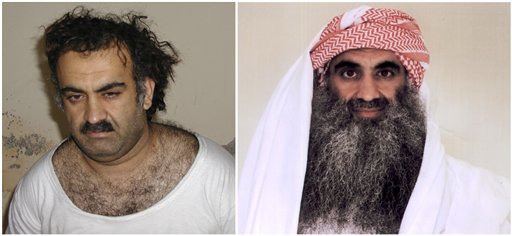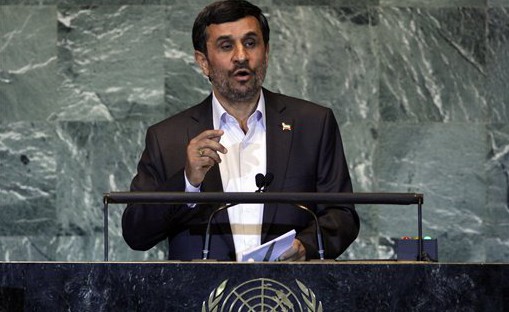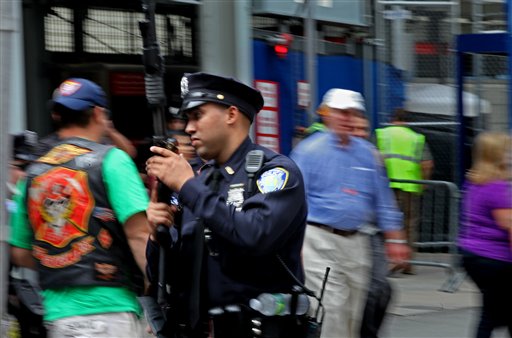
In this image taken from a video posted on extremist websites affiliated with al-Qaida on Thursday Dec 21, 2009, and reported to be made at an unknown location in Yemen, a man identified by the sites as Mohammed al-Kalwi, an al-Qaida activist, delivers a eulogy for militants killed in a Yemeni airstrike on a militant training camp to a large gathering of militants. He warned Yemeni forces against cooperating with Americans. "We are carrying a bomb to hit the enemies of God," he says.
Federal prosecutors charged more suspects with terrorism in 2009 than in any year since the attacks of Sept. 11, 2001, providing evidence of what experts call a rise in plots spurred by Internet recruitment, the spread of al-Qaida overseas and ever-shifting tactics of terror chiefs.
A review of major national security cases by The Associated Press found 54 defendants had federal terrorism-related charges filed or unsealed against them in the past 12 months.
The Justice Department would not confirm the figure or provide its own. But an agency spokesman said 2009 had more defendants charged with terrorism than any year since the 2001 attacks. The year that came closest was 2002, said the spokesman, Dean Boyd.
Bruce Hoffman, a terrorism expert at Georgetown University, called it “an extraordinary year, across the board,” adding that the wide range of cases show al-Qaida “is in it for the long haul and we need to be as well.”
The rate of terrorism charges accelerated in September, when authorities disrupted what they said was a burgeoning plot to detonate bombs aboard New York commuter trains. The quick pace of cases continued until the end of the year, with an attempted Christmas bombing aboard a Detroit-bound airliner.
One day alone was particularly heavy: On Sept. 24, federal prosecutors announced charges in five separate terrorism cases in Illinois, New York, North Carolina and Texas.
David Kris, the top terrorism official in the Obama administration’s Justice Department, marveled at the volume of terrorism cases when he spoke at a conference of lawyers in November.
“The last several weeks or months have been kind of a crucible experience for us,” Kris said.
What truly constitutes a terrorism case can be a matter of legal and political debate.
In counting major terrorism cases, the AP used a rigorous standard that produced a conservative count. The various charges that made the list include conspiring to provide material support to terrorists, conspiring to murder people abroad and conspiracy to use a weapon of mass destruction. The list also includes some cases that did not involve Islamic terrorists, such as the kidnapping of a U.S. citizen in Panama.
But the 54 defendants do not include, for example, those charged only with lying to agents in a terrorism investigation, or the Army psychiatrist in the Fort Hood military base shooting who faces nonterrorism murder charges brought by military prosecutors instead of civilian charges. Nor do the 54 include the five Washington, D.C.-area youths charged in Pakistan. If all those cases were also added — and some commentators do count them — the total number of defendants would be 63.
David Burnham of Transactional Records Access Clearinghouse, a private group at Syracuse University that analyzes government prosecution data, urged caution in counting terrorism charges.
“You have to be careful because everyone’s got a different way of doing it,” Burnham said.
Public charges don’t reflect other law enforcement activity, such as investigations that don’t lead to terrorism charges or sealed indictments that have yet to be revealed.
For example, in 2002 in the immediate aftermath of the Sept. 11 attacks, there were a tremendous number of active investigations, and in some cases suspected terrorists were not actually charged with terrorism, but faced lesser accusations such as credit card fraud or immigration violations.
As hectic as 2009 was, counterterrorism officials will only be busier this year as the administration prepares to bring some Guantanamo Bay detainees to trial in the U.S., predicted Patrick Rowan, who was President George W. Bush’s top Justice Department counterterrorism official and now works at the private law firm McGuire Woods.
“It is going to be an extremely busy and challenging year because of these Gitmo cases coming in that are going to place tremendous stress on the prosecutors, the judicial system, and the FBI,” said Rowan.
As for what’s behind the current increase, Rowan said it’s too soon to tell whether it’s a temporary rise or will continue.
Anti-terrorism agents and prosecutors are more experienced and better at building criminal cases, Rowan said, but the terrorists have also adapted, using the Internet to recruit or in some cases just motivate so-called lone-wolf attackers who take action on their own.






